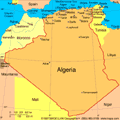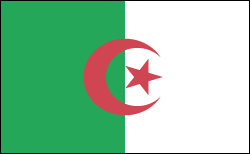GeographyNearly four times the size of Texas, Algeria is bordered on the west by Morocco and Western Sahara and on the east by Tunisia and Libya. The Mediterranean Sea is to the north, and to the south are Mauritania, Mali, and Niger. The Saharan region, which is 85% of the country, is almost completely uninhabited. The highest point is Mount Tahat in the Sahara, which rises 9,850 ft (3,000 m). GovernmentParliamentary republic. HistoryExcavations in Algeria have indicated that Homo erectus resided there between 500,000 and 700,000 years ago. Phoenician traders settled on the Mediterranean coast in the 1st millennium B.C. As ancient Numidia, Algeria became a Roman colony, part of what was called Mauretania Caesariensis, at the close of the Punic Wars (145 B.C.). Conquered by the Vandals about A.D. 440, it fell from a high state of civilization to virtual barbarism, from which it partly recovered after an invasion by Arabs about 650. Christian during its Roman period, the indigenous Berbers were then converted to Islam. Falling under the control of the Ottoman Empire by 1536, Algiers served for three centuries as the headquarters of the Barbary pirates. Ostensibly to rid the region of the pirates, the French occupied Algeria in 1830 and made it a part of France in 1848. Algerian independence movements led to the uprisings of 1954–1955, which developed into full-scale war. In 1962, French president Charles de Gaulle began the peace negotiations, and on July 5, 1962, Algeria was proclaimed independent. In Oct. 1963, Ahmed Ben Bella was elected president, and the country became Socialist. He began to nationalize foreign holdings and aroused opposition. He was overthrown in a military coup on June 19, 1965, by Col. Houari Boumédienne, who suspended the constitution and sought to restore economic stability. After his death, Boumédienne was succeeded by Col. Chadli Bendjedid in 1978. Berbers rioted in 1980 when Arabic was made the country's only official language. Algeria entered a major recession after world oil prices plummeted in the 1980s. First Parliamentary ElectionsThe fundamentalist Islamic Salvation Front (Front Islamique du Salut; FIS) won the largest number of votes in the country's first-ever parliamentary elections in Dec. 1991. To thwart the electoral results, the army canceled the general election, which plunged the country into a bloody civil war. An estimated 100,000 people have been massacred by Islamic terrorists since war began in Jan. 1992. The undeclared civil war escalated in its brutality and senselessness in 1997–1998. Islamic extremists, who had originally focused their attacks on government officials and then shifted to intellectuals and journalists, abandoned political motivations entirely and targeted defenseless villagers. The mass slaughters were as savage as they were random, and the government was markedly ineffectual in stemming the violence. Abdel-Aziz Bouteflika's ascension to the presidency in April 1999 was initially expected to bring peace and some economic improvement to this desperate war-torn country. Bouteflika, however, remains locked in power struggles with the military, whose support is crucial. Despite the appearance of democracy, Algeria remains in essence a military dictatorship. In 2001 violence by Islamic militants was again on the rise, and the long-disaffected Berber minority engaged in several large-scale protests. Attempts at ReformIn April 2004 presidential elections, praised by international monitors for their fairness, incumbent Bouteflika won 85% of the vote. Bouteflika stated that his second term would be devoted to solving the three-year-old crisis in the Berber region of Kabylia, freeing women from restrictive family codes, and bringing about “true national reconciliation” caused by the civil war. The country's dire economic situation has improved slightly, but Algeria still faces a high unemployment rate. In Oct. 2005, Algerians approved a controversial referendum sponsored by Bouteflika, the Charter on Peace and National Reconciliation, which grants amnesty to all Islamists and military officials involved in the country's bloody civil war. There is considerable doubt whether reconciliation is possible without holding anyone accountable, and the president's plan has been referred to as one of amnesia rather than amnesty. Reconciliation Efforts Are Thwarted by Acts of TerrorIn April 2007, about 35 people were killed and hundreds wounded when suicide bombers attacked a government building in Algiers and a police station on the outskirts of the capital. Al-Qaeda in the Islamic Maghreb claimed responsibility for the attack. The terrorist group struck again in December, killing as many as 60 people in two suicide attacks near UN offices and government buildings in the capital of Algeria. The bombings occur within minutes of each other. It was the worst attack in Algeria in more than 10 years. In June 2008, President Bouteflika replaced Prime Minister Abdelaziz Belkhadem with Ahmed Ouyahia, who had served twice as premier. At least 43 people were killed in August 2008, when a suicide bomber drove an explosives-laden car into a police academy in Issers, a town in northern Algeria. The next day, two car bombs exploded simultaneously at a military command and a hotel in Bouira, killing a dozen people. No group takes responsibility for the attacks, but Algerian officials said they suspected Al-Qaeda in the Islamic Maghreb was behind the bombings. | ||||
Algeria
Algeria declared independence from France in 1962. Read this country profile to learn more about the history, geography, and government of Algeria.
Subjects:
Infoplease
Provided by Infoplease—an authoritative, comprehensive reference website that offers an encyclopedia, a dictionary, an atlas, and several almanacs. Visit Infoplease.com to find more resources endorsed by teachers and librarians.








